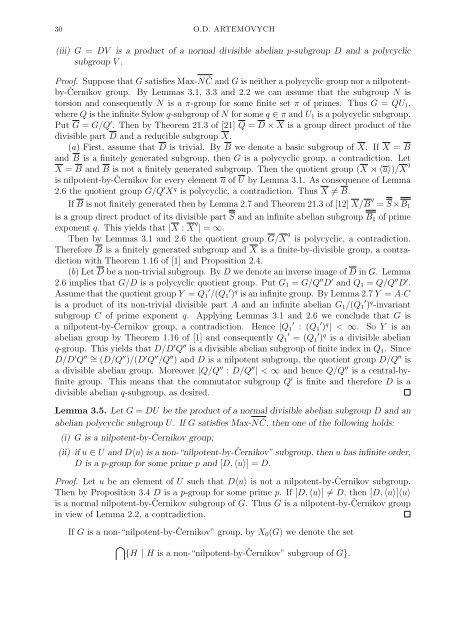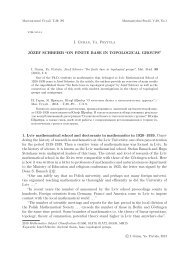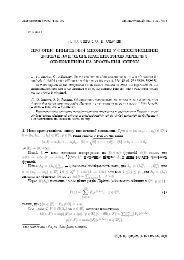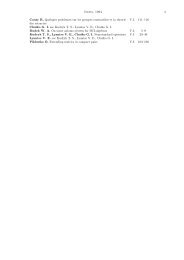SOLVABLE GROUPS WITH MANY CONDITIONS ON NILPOTENT ...
SOLVABLE GROUPS WITH MANY CONDITIONS ON NILPOTENT ...
SOLVABLE GROUPS WITH MANY CONDITIONS ON NILPOTENT ...
Create successful ePaper yourself
Turn your PDF publications into a flip-book with our unique Google optimized e-Paper software.
30 O.D. ARTEMOVYCH<br />
(iii) G = DV is a product of a normal divisible abelian p-subgroup D and a polycyclic<br />
subgroup V .<br />
Proof. Suppose that G satisfies Max-NČ and G is neither a polycyclic group nor a nilpotentby-Černikov<br />
group. By Lemmas 3.1, 3.3 and 2.2 we can assume that the subgroup N is<br />
torsion and consequently N is a π-group for some finite set π of primes. Thus G = QU 1 ,<br />
where Q is the infinite Sylow q-subgroup of N for some q ∈ π and U 1 is a polycyclic subgroup.<br />
Put G = G/Q ′ . Then by Theorem 21.3 of [21] Q = D × X is a group direct product of the<br />
divisible part D and a reducible subgroup X.<br />
(a) First, assume that D is trivial. By B we denote a basic subgroup of X. If X = B<br />
and B is a finitely generated subgroup, then G is a polycyclic group, a contradiction. Let<br />
X = B and B is not a finitely generated subgroup. Then the quotient group (X ⋊ 〈u〉)/X q<br />
is nilpotent-by-Černikov for every element u of U by Lemma 3.1. As consequence of Lemma<br />
2.6 the quotient group G/Q ′ X q is polycyclic, a contradiction. Thus X ≠ B.<br />
If B is not finitely generated then by Lemma 2.7 and Theorem 21.3 of [12] X/B q = S×B 1<br />
is a group direct product of its divisible part S and an infinite abelian subgroup B 1 of prime<br />
exponent q. This yields that |X : X q | = ∞.<br />
Then by Lemmas 3.1 and 2.6 the quotient group G/X q is polycyclic, a contradiction.<br />
Therefore B is a finitely generated subgroup and X is a finite-by-divisible group, a contradiction<br />
with Theorem 1.16 of [1] and Proposition 2.4.<br />
(b) Let D be a non-trivial subgroup. By D we denote an inverse image of D in G. Lemma<br />
2.6 implies that G/D is a polycyclic quotient group. Put G 1 = G/Q ′′ D ′ and Q 1 = Q/Q ′′ D ′ .<br />
Assume that the quotient group Y = Q ′ 1 /(Q ′ 1 ) q is an infinite group. By Lemma 2.7 Y = A·C<br />
is a product of its non-trivial divisible part A and an infinite abelian G 1 /(Q ′ 1 ) q -invariant<br />
subgroup C of prime exponent q. Applying Lemmas 3.1 and 2.6 we conclude that G is<br />
a nilpotent-by-Černikov group, a contradiction. Hence |Q 1 ′ : (Q ′ 1 ) q | < ∞. So Y is an<br />
′<br />
abelian group by Theorem 1.16 of [1] and consequently Q 1 = (Q ′ 1 ) q is a divisible abelian<br />
q-group. This yields that D/D ′ Q ′′ is a divisible abelian subgroup of finite index in Q 1 . Since<br />
D/D ′ Q ′′ ∼ = (D/Q ′′ )/(D ′ Q ′′ /Q ′′ ) and D is a nilpotent subgroup, the quotient group D/Q ′′ is<br />
a divisible abelian group. Moreover |Q/Q ′′ : D/Q ′′ | < ∞ and hence Q/Q ′′ is a central-byfinite<br />
group. This means that the commutator subgroup Q ′ is finite and therefore D is a<br />
divisible abelian q-subgroup, as desired.<br />
Lemma 3.5. Let G = DU be the product of a normal divisible abelian subgroup D and an<br />
abelian polycyclic subgroup U. If G satisfies Max-NČ, then one of the following holds:<br />
(i) G is a nilpotent-by-Černikov group;<br />
(ii) if u ∈ U and D〈u〉 is a non-“nilpotent-by-Černikov” subgroup, then u has infinite order,<br />
D is a p-group for some prime p and [D, 〈u〉] = D.<br />
Proof. Let u be an element of U such that D〈u〉 is not a nilpotent-by-Černikov subgroup.<br />
Then by Proposition 3.4 D is a p-group for some prime p. If [D, 〈u〉] ≠ D, then [D, 〈u〉]〈u〉<br />
is a normal nilpotent-by-Černikov subgroup of G. Thus G is a nilpotent-by-Černikov group<br />
in view of Lemma 2.2, a contradiction.<br />
If G is a non-“nilpotent-by-Černikov” group, by X 0(G) we denote the set<br />
⋂<br />
{H | H is a non-“nilpotent-by- Černikov” subgroup of G}.









